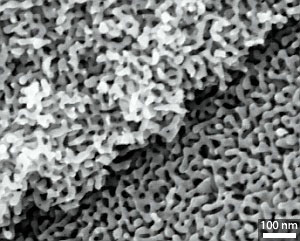Aug 23, 2011
A scanning electron microscopy image of a nanoporous gold material with externally controllable strength and ductility
The outer surfaces of machinery can change dramatically over time because their surfaces are exposed to the environment and general wear-and-tear. This can be dangerous because the surface state of a material greatly affects its overall physical properties. Maintaining a delicate balance between strength and ductility — the ability to deform under stress — is a particularly important engineering goal. Hai-Jun Jin at the Chinese Academy of Sciences in Shenyang and Jörg Weissmüller at Technische Universität Hamburg-Harburg in Germany have now exploited surface effects to produce a material in which the strength and ductility can be reversibly controlled by applying an electric field ("A Material with Electrically Tunable Strength and Flow Stress").
"Our study was inspired by the 'size effect', which means that the strength of a solid crystal increases with decreasing sample size, or more specifically, with increasing ratio of surface area to volume," explains Jin. "Also, the surface is exposed to the environment and its properties can be changed using electricity or chemicals."
To acquire a sample with a large specific surface area, the researchers created an assembly of gold nanowires with nanometer-sized pores throughout its bulk (pictured). They then filled the nanopores with an electrolyte and applied an external electrical field.
At low voltages, the sample was ductile, capable of being distorted significantly. On increasing the voltage, however, it became stronger, but less ductile. The researchers showed that at higher voltages, a single-atom layer of oxygen molecules became adsorbed to the surface of the pores, increasing the strength of the sample.
This observation has parallels with other observed effects that relate environmental conditions to the plasticity of a material, but previous work had shown a weakening on adding an electrolyte. Jin and Weissmüller's material shows the opposite behavior. What's more, their voltage effect has an important practical benefit: it seems to work even when the sample has lots of impurities and thus doesn't require expensive, ultrapure processing techniques.
"We believe that we have discovered a new 'intelligent' material that could adapt its mechanical performance to the environment, either spontaneously or in response to an external stimuli," says Jin. "It may also have implications for new materials with self-healing abilities."
Source: Nanowerk

0 comments:
Post a Comment